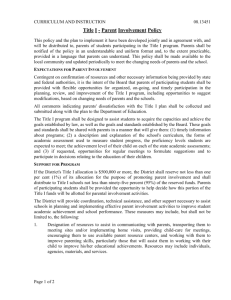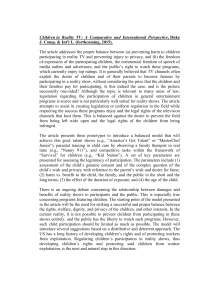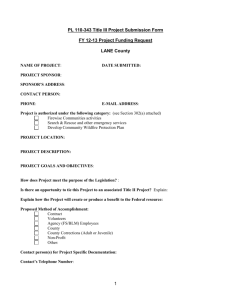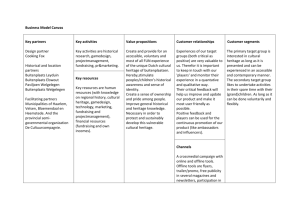DOCUMENT OF THE CRACOW SYMPOSIUM ON THE
advertisement
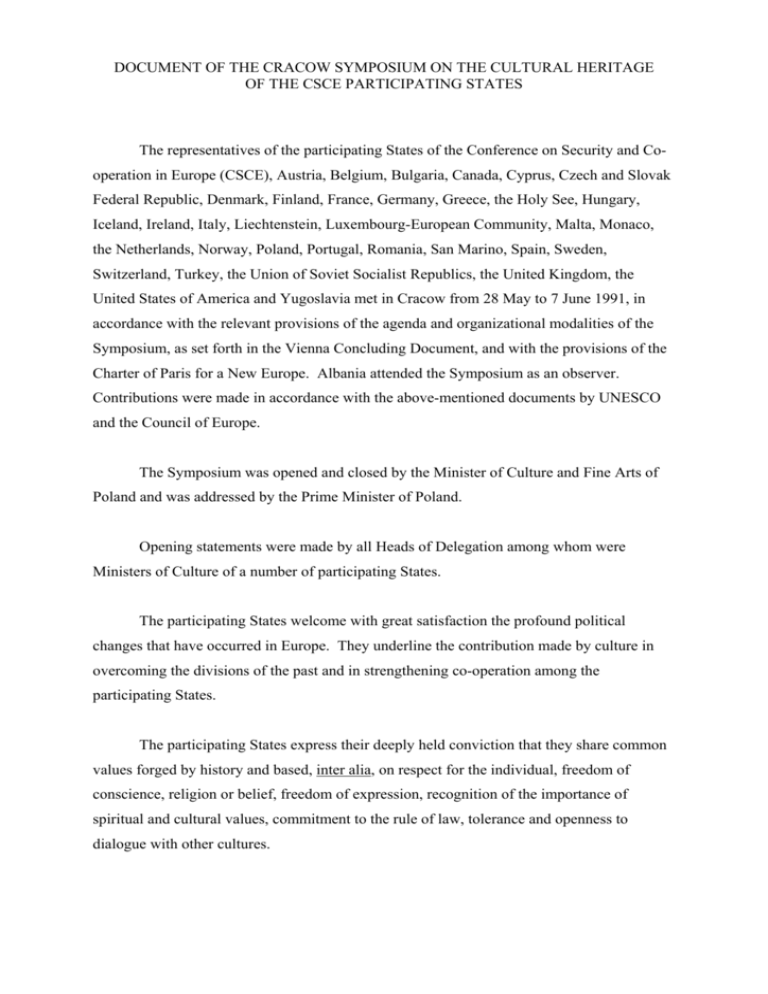
DOCUMENT OF THE CRACOW SYMPOSIUM ON THE CULTURAL HERITAGE OF THE CSCE PARTICIPATING STATES The representatives of the participating States of the Conference on Security and Cooperation in Europe (CSCE), Austria, Belgium, Bulgaria, Canada, Cyprus, Czech and Slovak Federal Republic, Denmark, Finland, France, Germany, Greece, the Holy See, Hungary, Iceland, Ireland, Italy, Liechtenstein, Luxembourg-European Community, Malta, Monaco, the Netherlands, Norway, Poland, Portugal, Romania, San Marino, Spain, Sweden, Switzerland, Turkey, the Union of Soviet Socialist Republics, the United Kingdom, the United States of America and Yugoslavia met in Cracow from 28 May to 7 June 1991, in accordance with the relevant provisions of the agenda and organizational modalities of the Symposium, as set forth in the Vienna Concluding Document, and with the provisions of the Charter of Paris for a New Europe. Albania attended the Symposium as an observer. Contributions were made in accordance with the above-mentioned documents by UNESCO and the Council of Europe. The Symposium was opened and closed by the Minister of Culture and Fine Arts of Poland and was addressed by the Prime Minister of Poland. Opening statements were made by all Heads of Delegation among whom were Ministers of Culture of a number of participating States. The participating States welcome with great satisfaction the profound political changes that have occurred in Europe. They underline the contribution made by culture in overcoming the divisions of the past and in strengthening co-operation among the participating States. The participating States express their deeply held conviction that they share common values forged by history and based, inter alia, on respect for the individual, freedom of conscience, religion or belief, freedom of expression, recognition of the importance of spiritual and cultural values, commitment to the rule of law, tolerance and openness to dialogue with other cultures. -2- They take note of the interrelationship between cultural life and the well-being of their peoples, and the special importance that this has for democratic countries in transition towards a market economy. They encourage support, as already undertaken, and the on-going assistance to those countries in preserving and protecting their cultural heritage. The participating States respect the irreplaceable uniqueness of all their cultures and will endeavour to promote continued cultural dialogue among themselves and with the rest of the world. They reaffirm their belief that respect for cultural diversity promotes understanding and tolerance among individuals and groups. They consider that the regional aspects of culture should in themselves constitute a factor in the understanding between peoples. Regional cultural diversity is an expression of the richness of the common cultural identity of the participating States. Its preservation and protection contribute to building a democratic, peaceful and united Europe. Reaffirming their commitment to the full implementation of the provisions relating to the cultural dimension in the Helsinki Final Act and other CSCE documents, the participating States agree on the following: I. CULTURE AND FREEDOM 1. The participating States emphasize that respect for human rights and fundamental freedoms is essential to the full development of cultural creativity. 2. The State and the public authorities will refrain from infringing upon the freedom of artistic creation. 3. The participating States undertake to promote and protect the free and unhindered development of artistic creativity; they recognize the important role of the individual artist in society and will respect and protect the integrity of creative work. -3- 4. They recognize the need for governments to strike a balance between their dual responsibility of acting in support of, and ensuring the freedom of, cultural activity. 5. They further acknowledge that, given the variety of cultural activity in the participating States, there are many ways in which governments might choose to respond effectively to concerns relating to the cultural heritage. 6. The participating States recall their respect for freedom of expression and, in connection with the exercise of that freedom in the artistic and cultural fields, state as follows: 6.1 The publication of written works, the performance and broadcasting of musical, theatrical and audiovisual works, and the exhibition of pictorial or sculptural works will not be subject to restriction or interference by the State save such restrictions as are prescribed by domestic legislation and are fully consistent with international standards. 6.2 They express their conviction that the existence, in the artistic and cultural fields, of a diversity of means of dissemination independent of the State, such as publishing houses, radio broadcasting, cinema and television enterprises, theatres and galleries, helps to ensure pluralism and the freedom of artistic and cultural expression. 7. The participating States recall their commitments to unhindered access to culture, and agree as follows: 7.1 While duly respecting intellectual property rights, any person or independent organization has the right to own privately, use and reproduce all kinds of cultural materials, such as books, publications and audiovisual recordings, and the means of reproducing them. 8. The participating States are resolved to promote the mutual knowledge of their respective cultures. Accordingly, they will encourage co-operation and exchanges in all fields of culture and creative work. 9. The participating States are convinced of the enrichment which regional and local cultures, including those connected with national minorities, bring to cultural life. -4- II. CULTURE AND HERITAGE 10. The participating States express their deeply-held conviction that the cultural heritage of each one of them constitutes an inalienable part of their civilization, their memory and their common history, to be transmitted to future generations. 11. The participating States take note of the definitions of archaeological property, of the cultural heritage and of the architectural heritage in the relevant international documents of the Council of Europe and UNESCO. 12. The complete and lasting documentation of sites, structures, cultural landscapes, objects and cultural systems, including historical, religious and cultural monuments, as they presently exist, is one of the most important legacies to the cultural heritage that can be provided for future generations. 13. The participating States also recognize as vital elements of their common cultural heritage, the heritage of those cultures which, because of language barriers, climate and geographical distance, limited population or turns of history and political circumstances, have not been widely accessible. 14. The participating states will endeavour to protect the cultural heritage, in compliance with relevant international agreements and with their domestic legislation. 15. The participating States will pay heed to the preservation, enhancement and restoration of the cultural heritage when drawing up cultural, environmental and regional and urban planning policies. They further note the importance of relating individual conservation projects to their authentic urban or rural environment, where appropriate and whenever possible. 16. The participating States recognize the importance of making their cultural heritage as widely accessible as possible. In doing so, they will pay particular attention to the needs of the handicapped. -5- 16.1 They will endeavour to safeguard the heritage from damage which may be caused by management of and public access to it. 16.2 They will promote public awareness of the value of the heritage and the need to protect it. 16.3 They will seek, wherever possible, to facilitate access for researchers and scholars to relevant primary documents and archive materials. 17. The participating States note favourably the role of non-governmental associations in promoting awareness of the heritage and the need for its protection. 18. Partnerships among diverse groups at the local, regional and national level, from both the private and the public sector, are valuable for ensuring the effective and representative preservation of the cultural heritage. The preservation and interpretation of the values and the cultural heritage of diverse groups will be enhanced with the involvement of those groups, which is conducive to the tolerance and respect for different cultures which are of paramount importance. 19. The participating States recognize the usefulness and importance of exchanging information on preserving the cultural heritage and acknowledge that the use of data banks, on a national and multilateral level, could make a useful contribution to this work. III. PRINCIPAL AREAS OF PRESERVATION AND CO-OPERATION 20. The participating States will encourage training, at the initial and advanced levels, for the various professions and crafts involved in preserving and restoring the cultural heritage, as well as in administering it. They agree to keep one another informed of any important developments in this field and to co-operate with one another. 20.1 The dissemination of knowledge and skills, especially vanishing skills related to the cultural heritage, through training, the exchange of personnel, research and technical publication, is necessary to ensure continuity in cultural preservation. They therefore reaffirm their commitments to encourage bilateral and multilateral exchanges of trainees and -6- specialists. 20.2 The participating States should invite the appropriate professional organizations to set up a national register of skilled craftspersons competent in the field of the protection and preservation of the cultural heritage, in order to facilitate contacts between such persons and the users of their services both nationally and internationally. 21. The participating States will exchange data on their cultural heritage policies, particularly regarding the methods, means and possibilities provided by new technologies. 22. The participating States will strive to share their knowledge and experience in the area of publishing and distribution of printed and audiovisual material. 22.1 With a view to increasing public awareness regarding the preservation of the cultural heritage, the participating States will make information available that will assist radio and television stations, as well as the print media, to promote information in this area. 23. They will endeavour to improve storage conditions for perishable cultural goods such as paper, film tapes and recorded sound materials, to establish national programmes for the preservation of the perishable cultural heritage and to set commonly accepted standards for all types of carriers of cultural products in order to safeguard the permanence of such items of culture. 24. The participating States will encourage the establishment of links between resource centres and data banks in cultural fields so as to facilitate the exchange of information between them. 25. With a view to a better understanding of the cultural values of the countries whose languages are less widely spoken, the participating States welcome the dissemination of knowledge about and of such languages, in particular through the translation and publication of literary works from these countries. The organization of international training courses for media and cultural personnel involved in promoting the understanding of less-spoken languages and less widely-known cultures should also be considered. -7- 26. Acknowledging the important contribution of religious faiths, institutions and organizations to the cultural heritage, the participating States will co-operate closely with them regarding the preservation of the cultural heritage and pay due attention to monuments and objects of religious origin whose original communities no longer use them or no longer exist in the particular region. 27. Bearing in mind the important role that regional aspects of culture may play in linking people across national borders, the participating States will favour regional co-operation at the level of local and national authorities as well as non-governmental organizations with a view to fostering good-neighbourly relations. 28. The participating States will accord due attention to strengthening the heritage of popular culture of the past, including indigenous and vernacular cultures, and to encouraging a contemporary popular culture within the framework of their overall efforts for the preservation, study, protection and promotion of mutual awareness of their cultural heritage. The participating States note the importance of research into various forms of expression of past and present cultures - symbolic practices, technical objects and knowledge, folk art, languages and the importance of doing what is necessary to highlight them. 29. The participating States will also pay attention to more recent contributions to the cultural heritage (art, including architectural works, of the 20th century). 30. The participating States will co-operate in preventing the illegal circulation of cultural objects, for example by considering adhering to the relevant international instruments. 31. The participating States will strive to preserve and protect those monuments and sites of remembrance, including most notably extermination camps, and the related archives, which are themselves testimonials to tragic experiences in their common past. Such steps need to be taken in order that those experiences may be remembered, may help to teach present and future generations of these events, and thus ensure that they are never repeated. 32. The interpretation of sensitive sites of remembrance can serve as a valuable means of promoting tolerance and understanding among people and will take into account social and cultural diversity. -8- 33. The participating States recognize that, in defining priorities for preservation, it is important to take into account both the intrinsic value of the cultural heritage, its relative state of deterioration and its historic cultural content. To this effect they will, as appropriate, endeavour to promote the use of risk charts, the exchange of information and the organization of on-site workshops, ideal also for the involvement of younger generations. 34. The participating States bear in mind that the preservation of the status of monuments and sites related to their history and culture, wherever they are located, constitutes an integral part of the overall efforts within the CSCE for the preservation and protection of the common cultural heritage. 35. The participating States believe that taking concerted measures to protect the common cultural heritage from environmental damage is necessary. To this end they will consider establishing or joining networks for the collection of data and co-ordination of research. They will endeavour to co-ordinate policy decisions and undertake direct measures to reduce the impact of air pollution and other degradation on the common cultural heritage. 36. With a view to protecting cultural sites in urban environments, measures will be taken by the participating States to counteract the effects of pollution on the architectural complexes of threatened cities; to restore, preserve and revitalize historical urban centres; and to safeguard sites and protect them from damage due to the increasing flow of tourists. 37. The participating States note the importance of protecting the cultural landscape, particularly in villages and rural areas, from the danger inherent in changes in the pattern of economic activities and in the impact of pollution, with a special view to protecting dwellings and coherent ensembles of the everyday living environment. 38. In view of the contribution which natural history can make to our understanding of the world of today and its evolution in the future, the participating States will endeavour to foster the preservation and interpretation of natural history sites and collections. -9- 39. The participating States note the importance of safeguarding public and private parks and historical gardens, as works of humanity and nature, due to their historical, botanical and social interest, including their decorative and architectural elements. 40. The participating States will endeavour to safeguard and protect the archaeological sites located on their territories, including sites located under water. They will bear this aspect in mind during regional development operations which are likely to be a threat to sites which have not yet been scientifically surveyed, excavated or restored. 41. They stress the need for co-ordination of the activities of international organizations and institutions, such as the Council of Europe and UNESCO, in order to contribute to the full development of cultural co-operation among the participating States. Bearing in mind the need to avoid duplication of effort, the participating States will co-operate closely within the competent international organizations to which they belong. * * * 42. The participating States welcome the positive contribution made by the representatives of UNESCO and the Council of Europe to the proceedings of the Cracow Symposium on the Cultural Heritage. They note that the work and activities of UNESCO will be of continuing relevance to the CSCE's consideration of cultural issues. They further acknowledge the Council of Europe's rich experience and expertise in cultural matters, in particular in protecting the European cultural heritage, and agree to consider appropriate ways in which the participating States might make use of the Council of Europe in the context of the CSCE's work in this area. 43. In the two Study Groups many experts from the participating States spoke on national experiences, and put forward ideas on areas of co-operation in the fields of cultural exchange and the preservation of cultural heritage, in particular on those aspects outlined in the mandate assigned to the respective groups. These contributions, copies of which will be deposited with the CSCE Secretariat, greatly contributed to the success of the Symposium. The participating States expressed their intention to pursue further these initiatives in appropriate international fora. - 10 - 44. The representatives of the participating States expressed their profound gratitude to the people and Government of Poland for the excellent organization of the Symposium and the warm hospitality extended to the delegations which participated in the Symposium. Cracow, 6 June 1991
